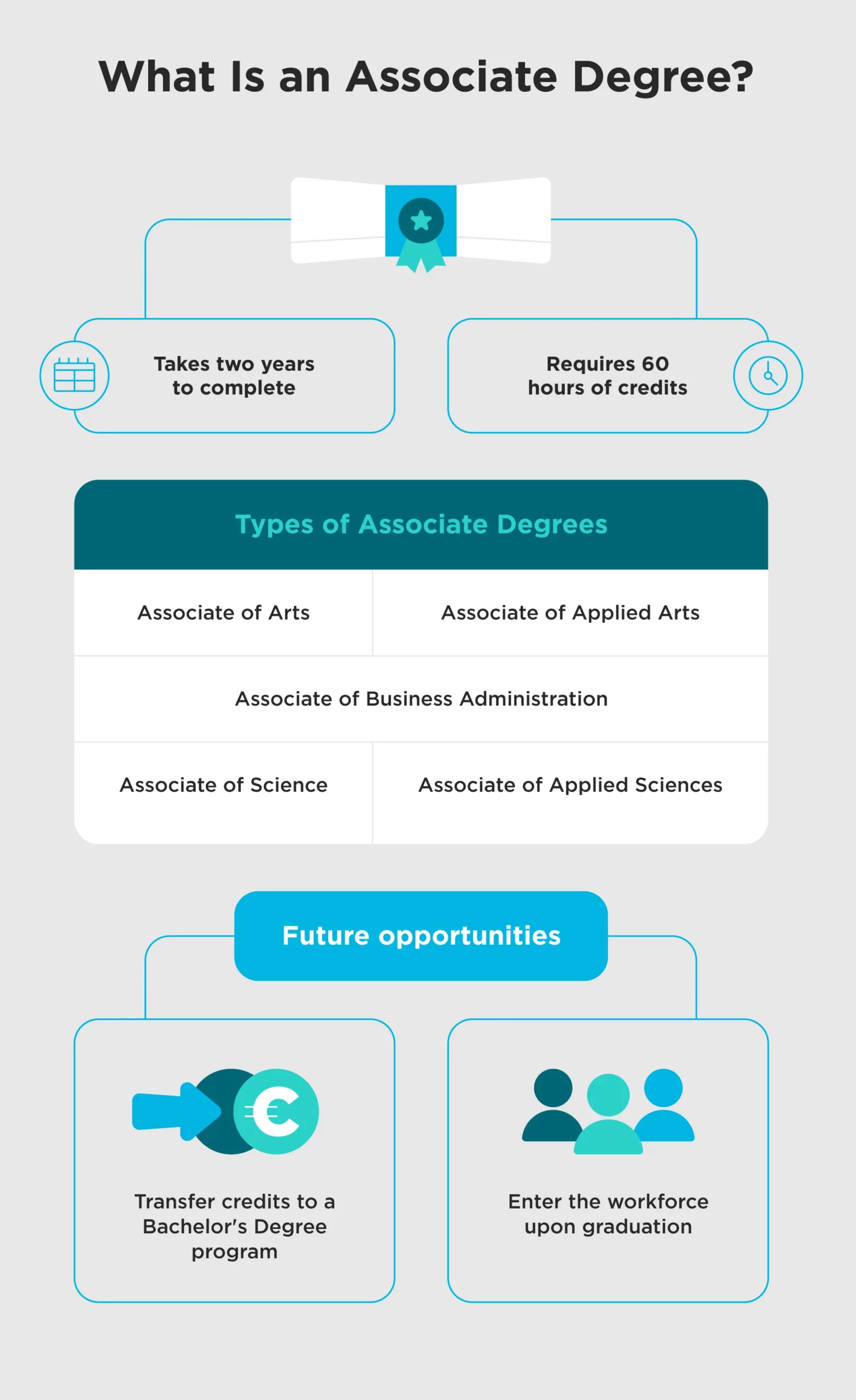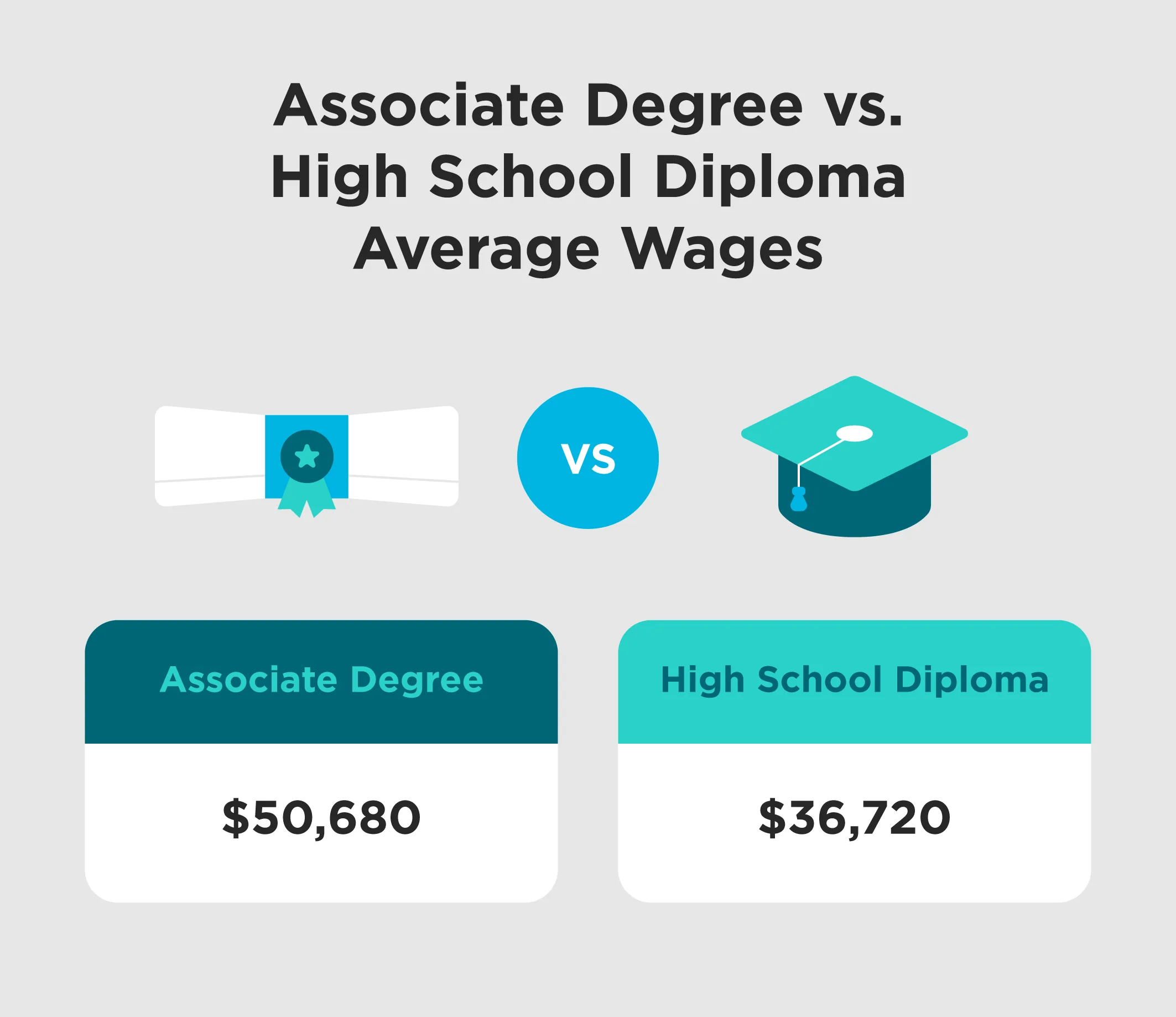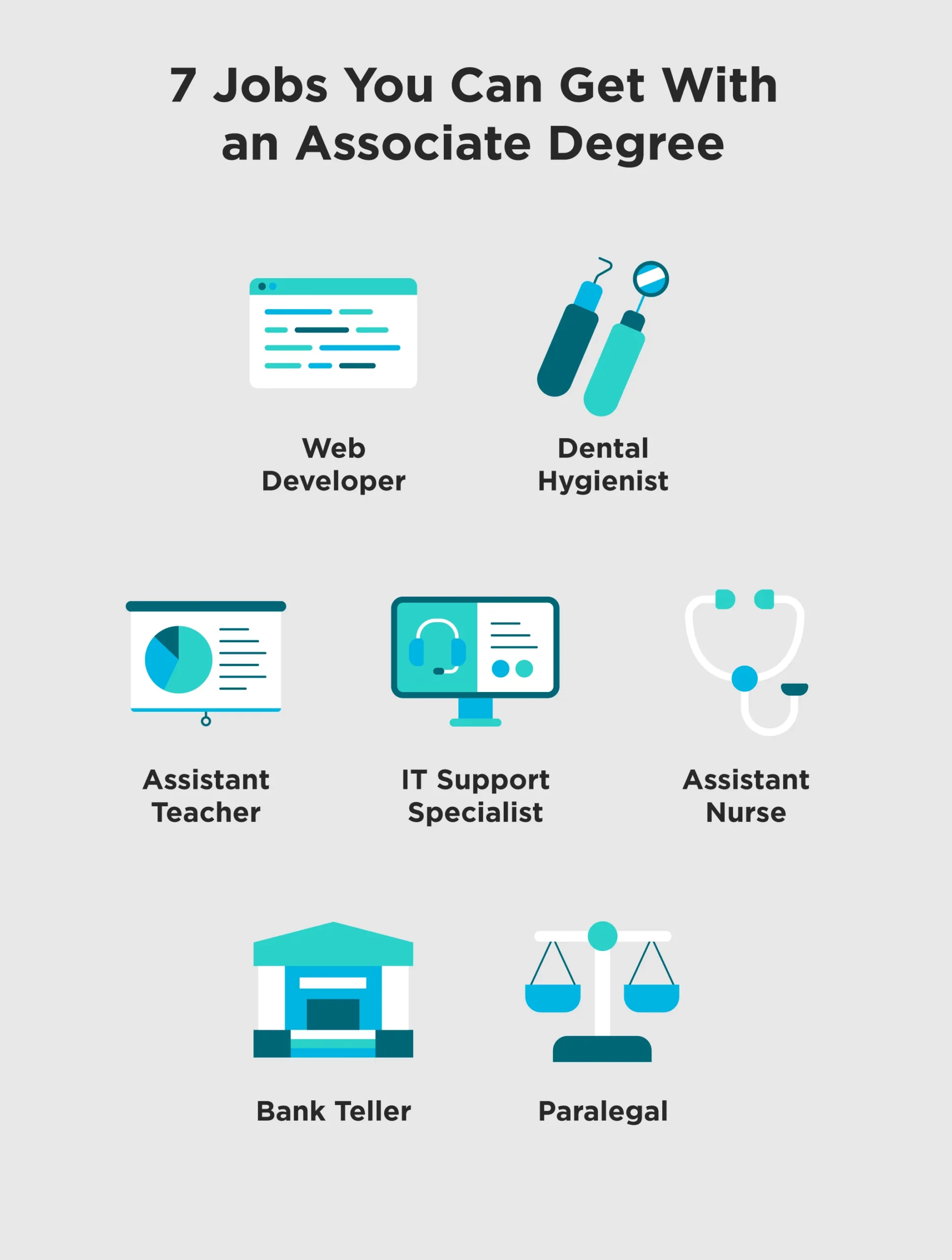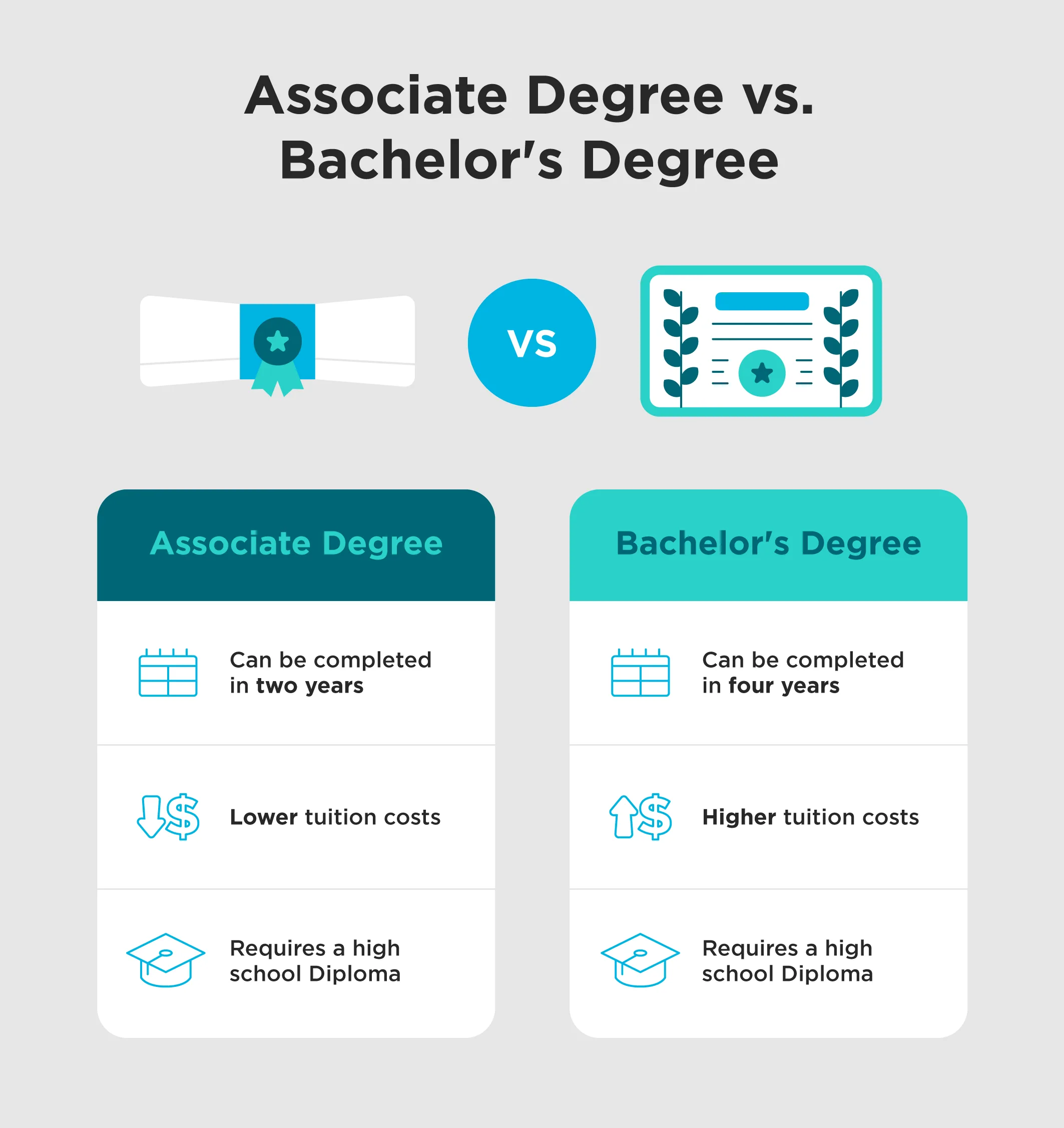What Is an Associate Degree? Everything You Need To Know

quick answer
An Associate Degree is an undergraduate academic program that provides students with the fundamental knowledge and practical skills to help secure employment or pursue further education. Typically, students take two years to complete an Associate Degree.
In This Article
An Associate Degree is a type of post-secondary education spanning two years that provides students with a solid base of general knowledge. Students also have the opportunity to specialize in a particular field of interest, such as science, business, or the arts. An Associate Degree is generally equivalent to the first two years of a Bachelor’s Degree program.
If you’re unsure what you should go to college for, an Associate Degree can open up many paths. Upon completion, you can choose to immediately enter the workforce or continue on to obtain a Bachelor’s Degree.
In this article, we’ll explain what an Associate Degree is and explore the different types of Associate Degrees available. We’ll also outline how an Associate Degree differs from a Bachelor’s Degree and a Diploma.
Read on to learn more about Associate Degrees in Canada.
In Canada, you can receive an Associate Degree once you complete 60 hours of credits from a community college or polytechnic institute. Whether you’re looking to upskill, make a career change at 40, or transfer credit to a Bachelor’s Degree, an Associate Degree can help you achieve your career goals.
When pursuing an Associate Degree, students take courses in English, Mathematics, Science, and Arts. They also have the opportunity to specialize in a field of study.

Pursuing an Associate Degree offers many benefits that can open doors for both your career and future education. Here are a few of the top benefits of Associate Degrees:

There are five different types of Degrees you can choose depending on your post-graduation career goals. While students in all programs take the same general education courses, some of your classes may differ depending on the type of Associate Degree you choose. Continue reading to discover what type of Associate Degree you should pursue depending on your future educational and career goals.
An Associate of Arts (AA) program is a well-rounded degree featuring foundational liberal arts courses such as English, Math and Science, Arts, Social Sciences, and Humanities. These courses are transferable to most four-year programs, allowing students to continue on to get a Bachelor of Arts degree.
While an AA degree provides students with general academic knowledge, you also have the option to specialize in the following areas of interest:
An Associate of Science (AS) program features a broad range of courses related to science, mathematics, and computer science. Upon graduation, individuals can move on to a Bachelor of Science program. AS specialization areas include:
Potential future career paths include a Biologist, Doctor,
Data Scientist, or Computer Programmer.
An Associate of Business Administration (ABA) degree provides students with fundamental business skills through courses such as the following:
Following graduation, you can pursue entry-level roles in business or continue on to get a four-year Bachelor of Business Administration (BBA) at one of the best business schools in Canada.
An Associate of Applied Sciences (AAS) degree prepares graduates to enter the workforce immediately upon graduating. Potential areas of focus include:
While an AAS degree is meant for those pursuing further education, it is more career-focused, so many of the credits aren’t transferable.
Similar to an AAS, an Associate of Applied Arts (AAA) is a broad degree that prepares students to enter the workforce after graduating. Depending on your goals, you may decide to focus your degree in one of the following areas:
If you’re hoping to enter the workforce upon graduating with your Associate Degree, you can pursue a wide range of careers across many different fields.From health care jobs to roles in information technology, here are some examples of jobs you can get with an Associate Degree:
While an Associate Degree can provide you with a wide range of jobs, you can unlock even more career opportunities after continuing on to get a Bachelor’s degree.

Associate Degrees and Bachelor’s Degrees are two of the most popular types of undergraduate degrees. Just like there are several differences between college and university, these two types of post-secondary degrees also differ.
When deciding which degree to pursue, it’s important to consider the time it takes to complete, tuition costs, and admission requirements. Here’s an overview of the main differences between an Associate Degree and a Bachelor’s Degree.
An Associate Degree takes two years to complete, while a Bachelor’s Degree spans four years. If you want to enter the workforce sooner rather than later, an Associate Degree could be the right option for you.
On average, an Associate Degree costs less than a Bachelor’s Degree due to the lower tuition fees and shorter duration. Since the average student loan debt in Canada is approximately $28,000, some students may opt for this more affordable option. Additional costs to keep in mind when deciding on a program include:
Both Associate Degree and Bachelor’s Degree programs require a high school diploma or GED. Depending on the program, other requirements include a minimum GPA and standardized tests. Typically, Associate Degree programs have less strict requirements than Bachelor’s Degree programs.

A Diploma is another type of post-secondary education offered in Canada that provides the skills needed to enter the workforce. A Diploma differs from an Associate Degree in that it is typically shorter in duration and more focused on a specific career.
Here are examples of Diploma programs offered at Robertson College:
Explore our full list of programs.
| Bachelor’s Degree | Associate Degree | Diploma or Certificate | |
|---|---|---|---|
| Length of program | Four years | Two years | One to two years |
| Credits | 120 credits | 60 credits | 30 credits |
| Admission requirements | Secondary school Diploma (additional requirements vary based on program) | Secondary school Diploma (additional requirements vary based on program) | Secondary school Diploma (additional requirements vary based on program) |
| Program focus | General academic knowledge with a concentrated major | Broad academic knowledge with specialization in a specific field | Specialized study |
| Career opportunities | Entry-level or mid-level positions in various fields | Entry-level positions in various fields | Entry-level technical or vocational careers |
Deciding on the right program for you depends on your future goals. Here are a few useful tips to help you decide on a post-secondary education:
Choosing the right education path for you can be difficult. Below, we’ve answered common questions about Associate Degree programs so you can decide if it’s right for you.
An Associate Degree is a two-year undergraduate degree. However, the exact amount of time it takes to complete depends on whether you’re a full-time or part-time student, your specific course load, and whether you earned transfer credits from high school courses.
An Associate of Arts degree is good for students looking to get a comprehensive education that opens doors to a wide range of career paths or further education opportunities.
To earn an Associate Degree, you must complete a minimum of 60 university program credits, meet your program’s minimum GPA requirements, and fulfill the specific requirements for your degree.
No, an Associate Degree is not the same as a Diploma. Although they are both two-year programs, Associate Degrees cover a broader range of knowledge, while Diplomas focus on a specific set of skills.
An Associate Degree is a great option for individuals looking to kick-start their careers or begin their journey of post-secondary education. However, keep in mind that this type of degree may not be the right choice for everyone. Depending on your specific goals, you may want to consider other options such as Diploma programs or online micro-courses.
At Robertson College, we offer a wide variety of flexible programs that will give you the skills you need to excel in your career. And as one of the best online colleges in Canada, we can accommodate both in-person and online students.
If you’re looking to get an accredited Diploma, Robertson College may be a great fit. Browse our programs today to learn more about the different options available.
In This Article
Once you take the first step, one of our Student Admissions Advisors will get in touch to better understand your goals for the future.
Apply Now